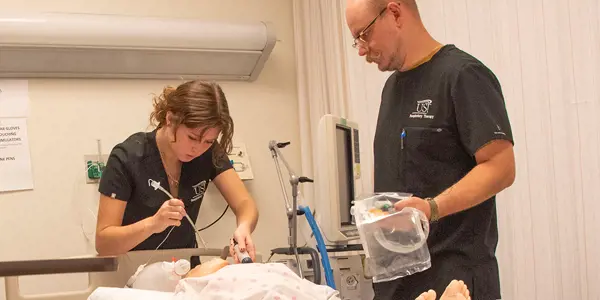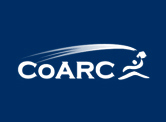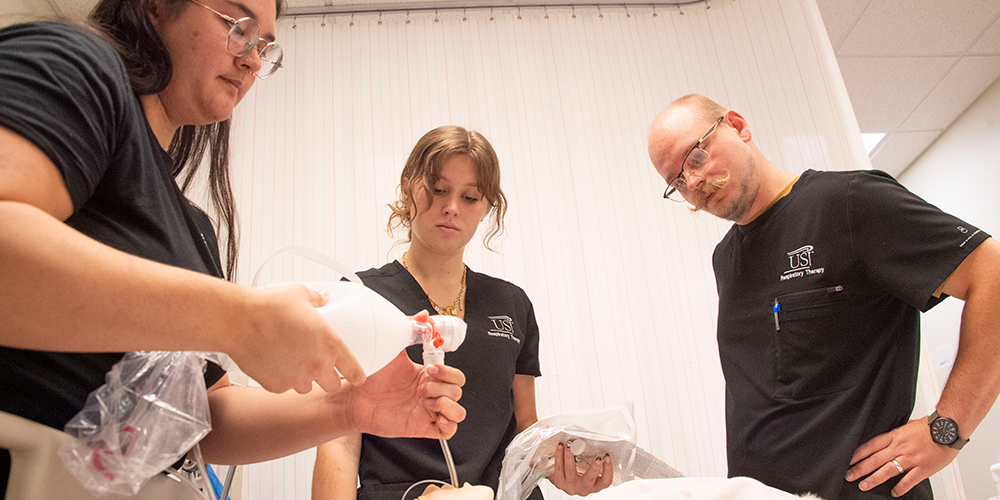
Upgrade your RRT to a BSRT degree entirely online and advance in your career as a respiratory therapist. USI has the only 100% online degree completion program for respiratory therapists in Indiana. Courses are only seven weeks long, completely online and designed for working professionals. With a BSRT degree, you can care for your patients with advanced skills, step into leadership roles, and gain new expertise and capabilities.
We are proud to be an RRT to BSRT program that holds continuing accreditation from the Commission on Accreditation for Respiratory Care (CoARC). In our RRT to BSRT online program you’ll prepare for advanced clinical respiratory therapist jobs. You will gain skills in critical thinking, problem-solving, time management, communication and practice that allow you to advance in your career, acquire advanced respiratory therapist jobs or continue your education in other healthcare specialties.
USI faculty and staff are dedicated to giving you the support you need no matter the modality for which you're taking classes. Check out our robust resources for online students including what online learning is, technology requirements and frequently asked questions.
Students may transfer in credits earned at an accredited community college or four-year university.
The University of Southern Indiana provides opportunities for RRT students progressing toward a BSRT degree to receive credit for previous professional experience. Students may receive credit for professional certification in a respiratory therapy specialty.
Validation with a nationally recognized certification:
Specific Course Validation Guidelines:
REST 499: Special Topics in Respiratory Therapy
Course Coordinator: Jody Delp – jmdelp@usi.edu 812-464-1778
National certification specific to special topic covered. Special topics include:
Admission to the program is competitive and the selection of the applicants is based upon the following criteria:
Non-native speakers of English must provide an official report confirming a TOEFL score of 197 (computerized test) or 71 (Internet based), or IELTS score of 6, or Cambridge English (Advanced) Minimum grade of C, or ELS Completion Level 112.
Obtaining a bachelor's degree in respiratory therapy can significantly enhance career opportunities, earning potential and job security in this growing and essential healthcare field.
Respiratory therapists are in high demand due to an aging population and the increasing prevalence of respiratory conditions such as asthma, chronic obstructive pulmonary disease (COPD) and other respiratory illnesses. According to the U.S. Bureau of Labor Statistics (BLS), employment of respiratory therapists is projected to grow 13% from 2022 to 2032, which is much faster than the average for all occupations.
A bachelor's degree can help meet the requirements for advanced certifications such as Registered Respiratory Therapist (RRT) and specialized credentials offered by the National Board for Respiratory Care (NBRC). Plus, a bachelor's degree provides a solid foundation for pursuing further education, such as a master's degree or doctoral programs, for those interested in research, teaching or higher-level administrative roles.
*income information provided by O*NET Online. Occupation opportunities vary by region and experience.
The University of Southern Indiana is committed to making college accessible to those wishing to further their education by providing numerous scholarships, grants, and financial aid options to assist students in managing tuition expenses.
 The University of Southern Indiana RRT-BSRT Program, 510009, in Evansville, Indiana is accredited by the Commission on Accreditation for Respiratory Care (www.coarc.com).
The University of Southern Indiana RRT-BSRT Program, 510009, in Evansville, Indiana is accredited by the Commission on Accreditation for Respiratory Care (www.coarc.com).
CoARC’s main website: www.coarc.com
Program number: 510009
View the accreditation statement for USI’s program:
CoARC accredits respiratory therapy education programs in the United States. To achieve this
end, it utilizes an ‘outcomes based’ process. Programmatic outcomes are performance
indicators that reflect the extent to which the educational goals of the program are achieved and
by which program effectiveness is documented.
Outcomes link: https://coarc.com/students/programmatic-outcomes-data/
Requirements for licensure and certification vary by profession and by state. USI has reviewed the educational requirements for each state and licensing agency to determine if the academic program here at USI meets the educational requirements to be eligible for licensure/certification in each state or not. Please note that some states may have additional requirements for licensure, such as residency requirements, additional non-academic certifications, etc. that USI cannot determine. We encourage you to check with your state's licensing agency for all requirements needed to obtain licensure.


